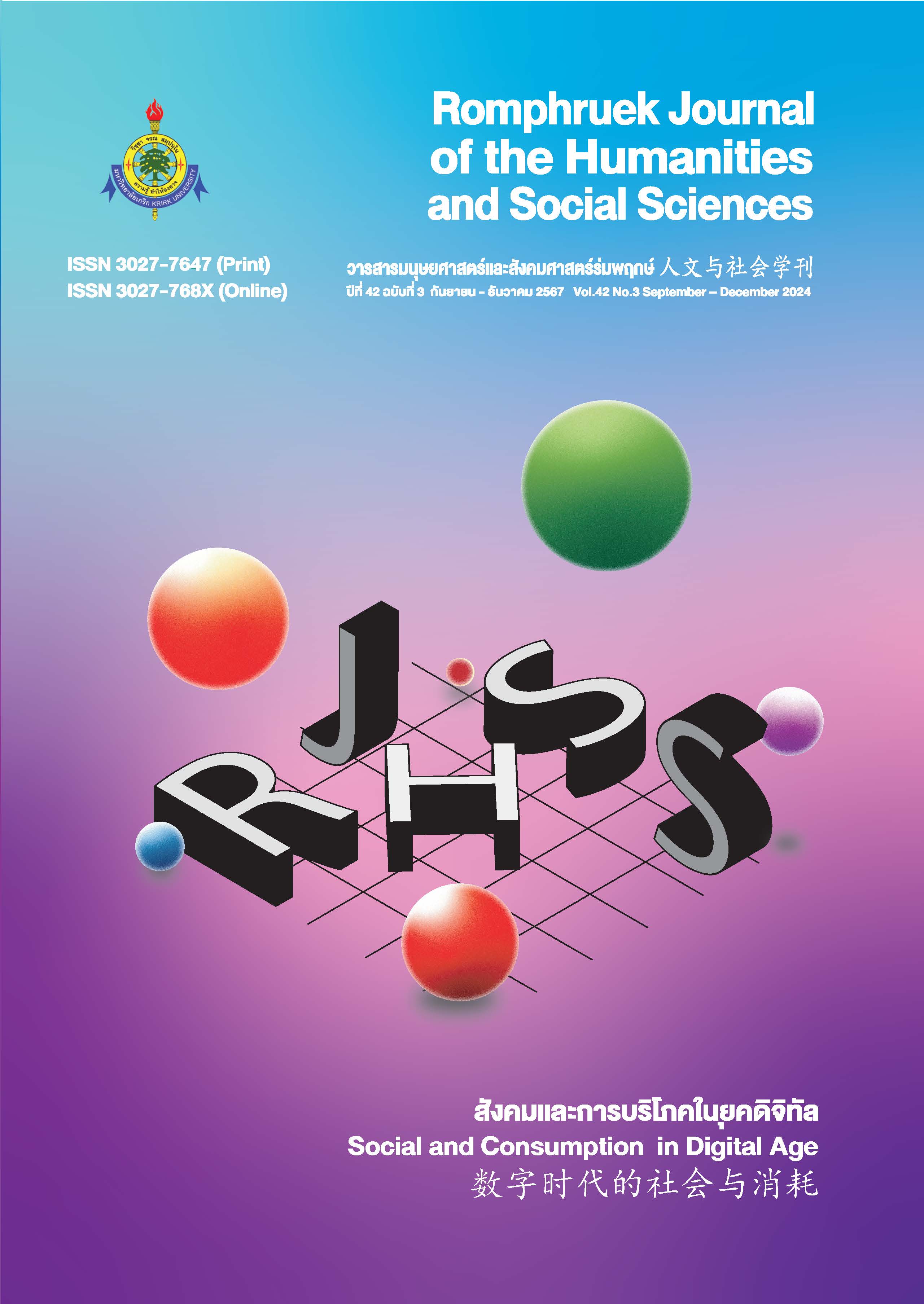Saudi Arabia Vision 2030 towards the Opportunities of Halal Industry in Thailand
Main Article Content
Abstract
The article on “Saudi Arabia Vision 2030 towards the Opportunities of Halal Industry in Thailand” aims to examine the vision 2030 of Saudi Arabia and evaluate the halal industries of Thailand in Saudi Arabian’s market. The trend of Thai-Saudi relations appears to be on the rise after the return of their relationship in 2022, which brings more opportunities for the two countries to collaborate in all dimensions. The methodology of this study was primary involved collecting data from the documents, government policies and analyzed the scenario of international relations. The study found that Halal industries in Thailand have been prepared for Saudi’s market by the Central Islamic Council of Thailand which is the main body responsible for establishing standards and preparing Thailand's halal sectors to received the permission from the Saudi Food and Drug Authority (SFDA). As a result, the products under the verification from the CICOT have also been permitted to export to the Saudi’s market which could encourage more entrepreneurship to engage in the halal exporting and enhance the increasing trend.
Article Details

This work is licensed under a Creative Commons Attribution-NonCommercial-NoDerivatives 4.0 International License.
Every article published in the Romphruek Journal of the Humanities and Social Sciences is the opinion and point of view of the authors. Thery're not the viewpoint of Krirk University or the editored department. Any part or all of the articles for pablication must be clearly cited.
References
กาญจนา ธรรมาวาท และ ณัฐพล ขันธไชย. (2022). ศักยภาพการผลิตและการตลาดของธุรกิจอาหารฮาลาล ในกรุงเทพมหานครและปริมณฑล. KASEM BUNDIT JOURNAL, 23(2), 81–98. https://so04.tci-thaijo.org/index.php/jkbu/article/view/262545.
กาญจนา ธรรมาวาท. (2022). ศักยภาพการผลิตและการตลาดของธุรกิจอาหารฮาลาล. วารสารเกษมบัณฑิต, 23(2), 81–98.
จรัญ มะลูลีม. (2556, 8 มิถุนายน). สัมพันธ์ไทย-ซาอุดีอาระเบีย: ขอบฟ้าใหม่สำหรับการค้าและการลงทุน (1). มติชนสุดสัปดาห์. https://www.matichonweekly.com/column/article_680337.
ไทยรัฐออนไลน์. (2565, 19 กันยายน). ส.อ.ท.เปิดตลาดส่งออกซาอุดีอาระเบีย ลุยเกษตร-อาหาร-อุตสาหกรรม. https://www.thairath.co.th/money/economics/analysis/2499602.
ธนวัฏ เสือแย้ม และ รัชดา คงขุนเทียน. (2565, 13 กันยายน). ภาคเอกชน ชี้ผลสำเร็จเยือนซาอุฯ ช่วยขยายตลาดส่งออก-ผลักดันการค้าของไทย. ข่าวออนไลน์RYT9. https://www.ryt9.com/s/iq03/3356286.
นาวา จันทนสุรคนม. (2566, 19 เมษายน). สภาอุตสาหกรรมแห่งประเทศไทยมองโอกาสลงทุนซาอุฯ แนะภาคธุรกิจเตรียมความพร้อม-เพิ่มขีดความสามารถแข่งขัน. สำนักข่าวอินโฟเควสท์. https://www.infoquest.co.th/2023/293882.
บัณฑิต อารอมัน. (2567). นโยบายการส่งเสริมฮาลาลและการสนับสนุนธุรกิจฮาลาลในประเทศไทย. วารสารอิสลามแห่งประเทศไทย, 1(1), 34–50. https://so16.tcithaijo.org/index.php/TIJ/article/view/672.
ปิยะพงศ์ เสนีย์รัตนประยูร นิกร ศิริวงศ์ไพศาล และเสกสรร สุธรรมานนท์. (2015). กลยุทธ์การจัดการโซ่อุปทานอุตสาหกรรมอาหารฮาลาลของไทย: กรณีศึกษาอุตสาหกรรมอาหารทะเล. วารสารหาดใหญ่วิชาการ, 14(1), 27-42.
เลอพงษ์ ซาร์ยีด, & กฤษณา ไวสํารวจ. (2019). การขับเคลื่อนนโยบายอุตสาหกรรมกิจการฮาลาลและการจัดการ. วารสารดุษฎีบัณฑิตทางสังคมศาสตร์, 9(1), 46-49.
ยุทธศาสตร์การส่งเสริมและพัฒนาศักยภาพธุรกิจสินค้าและบริการฮาลาล (พ.ศ. ๒๕๕๙ – ๒๕๖๓) .(2558). ยุทธศาสตร์ชาติ พ.ศ. 2561 – 2580. https://www.dip.go.th/Portals/0/2558/Busarin/ข่าวฝาก/Halal%20Strategy.pdf.
วินัย ดะห์ลัน. (2552, 5 ตุลาคม). สัญลักษณ์แห่งคุณภาพสินค้าฮาลาลระดับโลก Halal Q. Positioning .https://positioningmag.com/49548.
สันติ บางอ้อ. (2556). การเพิ่มขีดความสามารถในการแข่งขัน: ต้องเริ่มต้นด้วยคำถามไม่ใช่คำตอบ. เศรษฐกิจ, 1(1), 15–30.
สาริกา ค้าสุวรรณ. (2011). นโยบายส่งเสริมการส่งออกอาหารฮาลาลไทย และปัจจัยที่ส่งผลต่อภาพลักษณ์อาหารฮาลาลไทยในกลุ่มผู้บริโภคมุสลิมตะวันออกกลาง. วารสารศรีนครินทรวิโรฒวิจัยและพัฒนา สาขามนุษยศาสตร์และสังคมศาสตร์, 3(6), 137–161.
สำนักงานมาตรฐานสินค้าเกษตรและอาหารแห่งชาติ. (2565). มาตรฐานฮาลาลแห่งชาติ. https://www.acfs.go.th/halal/general.php.
อนุชา บูรพชัยศรี. (2565,17 ธันวาคม). ‘อาหารไทย อาหารโลก’ ต่อยอดฮาลาลของไทยขยายตัวเพิ่ม 64.65%. workpointTODAY . https://www.pewresearch.org/religion/2017/04/05/the-changing-global-religious-landscape/pf_17-04-05_projectionsupdate_change310px/.
Ajzen, I. (1991). The theory of planned behavior. Organizational Behavior and Human Decision Processes, 50(2),179-211.
Asif, M. (2022). Thai-Saudi business opportunities: A new horizon for trade & investment. Krirk National and International Conference on A New Paradigm of Thai Chinese and Saudi Arabian Research, 17 December 2023.
finnomena. (2008). การลงทุนในตลาดหุ้น: แนวทางและกลยุทธ์. https://www.finnomena.com
Kamal, A. (2014). Sustainable development in emerging markets. Journal of Environmental Management, 45(3), 123–135.
Khalek, A. A., & Syed Ismail, S. H. (2015). Why are we eating halal? Using the theory of planned behavior in predicting halal food consumption among Generation Y in Malaysia. International Journal of Social Science and Humanity, 5(7), 608-612. https://doi.org/10.7763/IJSSH.2015.V5.526.
Lasrado, J. (2020, July 20). How Saudi is moving from food security to food self-sufficiency. Forbes Middle East. https://www.forbesmiddleeast.com/consumer/food-and-drink/how-saudi-is-moving-from-food-security-to-food-self-sufficiency-1.
Porter, M. E. (1980). Competitive strategy: Techniques for analyzing industries and competitors. Free Press.
Saudi Vision 2030. (2022). The journey so far. https://www.vision2030.gov.sa/media/h4tosn55/ceda-vision-2030-5-year-update-v22.pd.
Supaat, S. H., Nizam, N. Z., & Ahamat, A. (2019). Through the theory of planned behaviour (TPB) for extended model of entrepreneurs’ intentions to involve in halal industry. International Journal of Recent Technology and Engineering, 8(4), 4450-4458.
Mreport. (2565, 8 พฤศจิกายน). ไทย-ซาอุดีอาระเบีย 9 เดือน คืบหน้าธุรกิจและการลงทุน 7 ด้านสำคัญ. https://www.mreport.co.th/news/economy/325-Update-on-Thailand-Saudi-Arabia-Investment-in-2022.
THACCA. (2022). ไทยอยู่ตรงไหนของอุตสาหกรรมฮาลาลโลก. https://thacca.go.th/article/food-halal.


